My daughters ate a lot of frozen peas and corn when they were young.
 Now I’m being told by Europeans I’m stupid.
Now I’m being told by Europeans I’m stupid.
As I’ve written before, Chapman and I did a bunch of work with the processing vegetable growers in Ontario (that’s in Canada).
We didn’t do any testing, but all the plants we visited had internal Listeria testing and used test-and-hold procedures. That was over 15 years ago.
Additionally, the blanching process should have removed Listeria (but should be verified).
The UK Food Standards Agency, Food Standards Scotland, Public Health England and Health Protection Scotland – that’s a lot of admin types — are reminding people that most frozen vegetables, including sweetcorn, need to be cooked before eating. This includes if adding them to salads, smoothies or dips.
People should always follow manufacturers’ instructions when preparing their food. If the product is not labelled as “ready to eat”, the cooking instructions should always be followed before eating the food hot or cold.
In the UK, that means piping hot mush.
Any barfbloggers in the EU wanna take a picture of those clear cooking instructions on frozen corn and send them on?
Last week, the European Food Safety Authority said that frozen corn and possibly other frozen vegetables are the likely source of an outbreak of Listeria monocytogenes that has been affecting Austria, Denmark, Finland, Sweden, and the United Kingdom since 2015.
Experts used whole genome sequencing to identify the food source, which initially was thought to be limited to frozen corn. As of 8 June 2018, 47 cases including nine deaths had been reported.
The same strains of L. monocytogenes have been detected in frozen vegetables produced by the same Hungarian company in 2016, 2017 and 2018. This suggests that the strains have persisted in the processing plant despite the cleaning and disinfection procedures that were carried out.
 The available information confirms the contamination at the Hungarian plant. However, further investigations, including thorough sampling and testing, are needed to identify the exact points of environmental contamination at the Hungarian plant. The same recommendation applies to other companies belonging to the same commercial group if environmental contamination is detected.
The available information confirms the contamination at the Hungarian plant. However, further investigations, including thorough sampling and testing, are needed to identify the exact points of environmental contamination at the Hungarian plant. The same recommendation applies to other companies belonging to the same commercial group if environmental contamination is detected.
On 29 June 2018, the Hungarian Food Chain Safety Office banned the marketing of all frozen vegetable and frozen mixed vegetable products produced by the affected plant between August 2016 and June 2018, and ordered their immediate withdrawal and recall. This last measure is likely to significantly reduce the risk of human infections and contain the outbreak. All freezing activity at the plant has been stopped.
New cases could still emerge due to the long incubation period of listeriosis (up to 70 days); the long shelf-life of frozen corn products; and the consumption of frozen corn bought before the recalls and eaten without being cooked properly.
To reduce the risk of infection, consumers should thoroughly cook non ready-to-eat frozen vegetables, even though these products are commonly consumed without cooking (e.g. in salads and smoothies). This applies especially to consumers at highest risk of contracting listeriosis – such as the elderly, pregnant women, new-borns and adults with weakened immune systems.
Frozen fruit and veg: That’s what my 2-decade hockey buddy, who also has four Canadian kids about the same age as mine, said when I asked, how do you go about managing the food for all these kids (along with the pets and horses).
But like Hepatitis A in frozen fruit, I now cook the shit out of them.
 One of the three confirmed cases had travelled to Morocco. In response, five additional European Union (EU) countries (France, Germany, the Netherlands, Spain and the United Kingdom (UK)) reported cases (n = 20) infected with the same strain between 21 January and 10 April 2018.
One of the three confirmed cases had travelled to Morocco. In response, five additional European Union (EU) countries (France, Germany, the Netherlands, Spain and the United Kingdom (UK)) reported cases (n = 20) infected with the same strain between 21 January and 10 April 2018.










